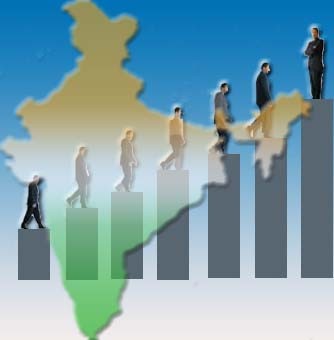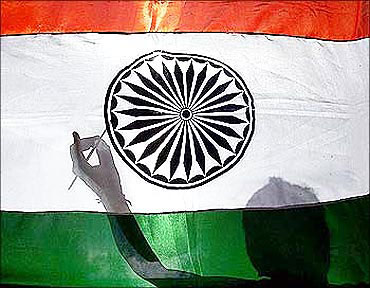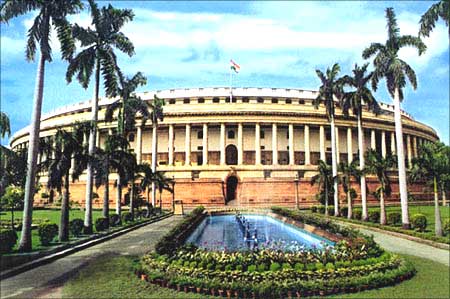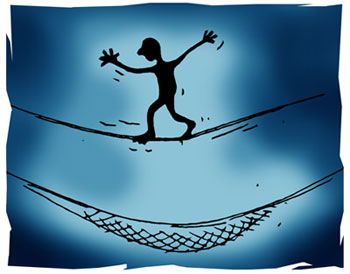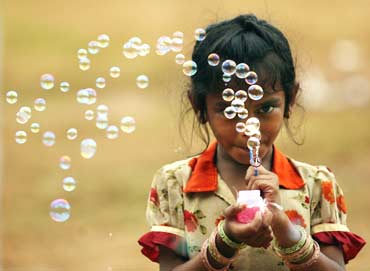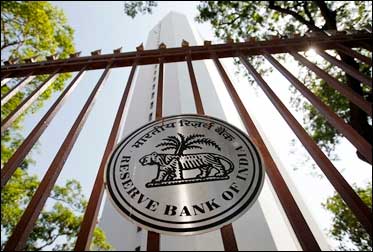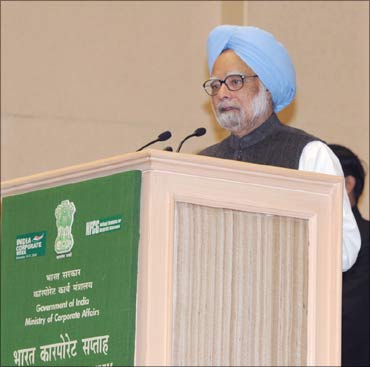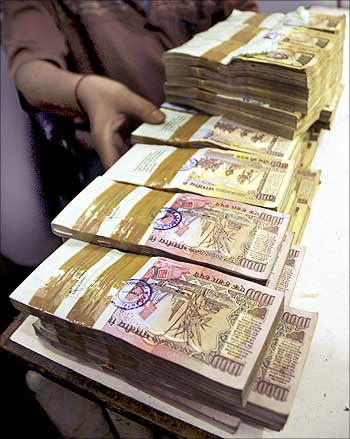 | « Back to article | Print this article |
Highs and lows mark 2010 India
It is difficult to describe India in 2010 without invoking Charles Dickens. The year that will be over this Friday has seen the best of times, as also the worst of times.

If the economy revived with steady growth, inflation remained a concern and reforms were sluggish.
The world hailed India not as an emerging power but as one that had 'emerged'.
At home, however, governance hit a new low, as corruption charges against the government dampened overall morale, affected its functioning and paralysed the entire winter session of Parliament. Never before in recent past had a year seen such stark contrasts.
Click NEXT to read further. . .
Highs and lows mark 2010 India
The Indian economy roared back in 2010, with the Gross Domestic Product, or gross domestic product, growing at 8.6 per cent in the first quarter (January-March) and then going up a notch closer to nine per cent in the next two quarters of April-June and July-September.

Industrial output indicators remained erratic as some months clocked double-digit growth rates, while others recorded lows of around four to five per cent.
Yet, the overall outlook remained bright, with industrial growth set to be in double digits and good a monsoon brightening the prospects of agricultural production.
Emboldened by expectations of such revival, Finance Minister Pranab Mukherjee used the Budget for 2010-11 to roll back some of the fiscal stimulus measures introduced in the wake of the global financial meltdown in late 2008.
Click NEXT to read further. . .
Highs and lows mark 2010 India
In subsequent months, the Reserve Bank of India followed suit by taking many 'tiny steps' to gradually tighten the money market and gently nudge the interest rates upwards.

Export growth in the first quarter was robust, at 36 per cent.
It slowed down to 27 per cent in the subsequent two quarters, but the outlook appeared much better than in 2009, though the world's key export markets were yet to recover from their post-2008 recessionary blues.
What kept the domestic manufacturing sector's hopes alive was the continuing rise in non-oil imports.
Click NEXT to read further. . .
Highs and lows mark 2010 India
However, higher crude oil prices and non-oil imports widened the trade deficit to record levels.

The balance of payments came under mild pressure, with the current account deficit threatening to touch three per cent of GDP, in spite of remittances from abroad continuing to post respectable growth.
What helped was the surplus on the capital account, propped up by a record surge in flows from foreign institutional investors into the stock market.
This more than made up the sharp fall in inflows from a lower level of foreign direct investment.
The biggest concern arose from inflation, which the government failed to tame for almost all of 2010.
Click NEXT to read further. . .
Highs and lows mark 2010 India
The wholesale price index-based inflation ruled at well above 10 per cent for the first three quarters and declined to around 9 per cent only in the last quarter.

The food inflation rate was higher, touching 17-18 per cent. It has now declined, but continues to be in double digits.
Government economists, and even Prime Minister Manmohan Singh, hope that the inflation rate would decline to 5.5 per cent by the end of March 2011.
Equally alarming was the government's failure in moving ahead on the two key reform measures the Budget had announced in February.
The government postponed by a year the launch of the Direct Taxes Code, a new regime ushering in simplified and lower taxes for companies and individuals.
Click NEXT to read further. . .
Highs and lows mark 2010 India
The government was also set to miss its April 2011 deadline for introducing the goods and services tax, or GST, thanks to the rising assertiveness of states, which took advantage of a Centre that appeared to be getting weaker and indecisive.

There is no fresh date for the launch of GST.
Petrol prices were decontrolled, but the promised steps on similar pricing freedom for diesel, liquefied petroleum gas and kerosene are on the back burner.
If India's emergence as a major voice at the Group of Twenty, or G-20, forum heralded its new status in the world economy, its handling of Naxal violence spreading to many more districts at home exposed chinks in the government's ability to tackle such a movement.
Click NEXT to read further. . .
Highs and lows mark 2010 India
Disturbances in Jammu & Kashmir for several weeks also raised doubts about the government's efficacy in administration of such sensitive domestic issues.

Heads of five countries -- all of them permanent members of the Security Council -- visited New Delhi in 2010.
And, all of them -- David Cameron, Barack Obama, Nicolas Sarkozy, Wen Jiabao and Dmitry Medvedev -- endorsed the need for United Nations reforms and supported, or recognised, India's claims to be a permanent member of the Security Council.
However, at home, the government was under attack, first for delays and then for alleged corruption in the conduct of the 19th Commonwealth Games held in New Delhi in October.
Click NEXT to read further. . .
Highs and lows mark 2010 India
Irregular allotment of houses in Mumbai's Adarsh Housing Society, which was meant for the benefit of families of Kargil war victims, and allocation of 2G telecom licences in violation of norms were the other corruption scandals that undermined the government's image.

Prime Minister Manmohan Singh removed A Raja as the communications minister, but the Opposition continued to demand the institution of a joint parliamentary committee, or JPC, to probe the allegations.
In an unprecedented breakdown of Parliamentary traditions in Independent India, the entire winter session of Parliament remained paralysed, as the Opposition refused to allow conduct of any business while the government, too, stuck to its stand that there was no need for a JPC.
Click NEXT to read further. . .
Highs and lows mark 2010 India
Similarly, at the climate conference in Cancun, India played a major role in salvaging an agreement to curb global warming, including the setting up of a $100-billion fund to help developing countries, but at home, major industrial projects remained stalled, with the environment and forests ministry raising objections to them, citing their adverse impact on environment.

The policy has raised a question mark on projects in 30 per cent of the country's coal-bearing areas, a move that has created a split within the government, with Planning Commission Deputy Chairman Montek Singh Ahluwalia seeking a review of such a stance.
There was also no progress in finalising the legal framework for rehabilitation and resettlement of people displaced while acquiring land for large projects.
Click NEXT to read further. . .
Highs and lows mark 2010 India
Manmohan Singh: A picture of paradox
Prime Minister Manmohan Singh was a picture of paradox in 2010.
The world hailed him as a great leader and the G-20 summits at Montreal and Seoul showed how global leaders looked up to him for guidance and advice.

Never before had leaders of five members of the Security Council visited India in the same year in the gap of a few weeks and made friendly noises.
Yet, at home, Singh has appeared as a leader beleaguered by charges of corruption against his government on the Commonwealth Games and the allocation of 2G telecom licences.
Click NEXT to read further. . .
Highs and lows mark 2010 India
His move to offer himself before the Public Accounts Committee for its scrutiny on the telecom case may be hailed as a bold move, but the charge that he has grown weak will stick for some more time.

His critics point to several errors of judgement on his part -- his failure to take quick action against those who mishandled the organisation of the Commonwealth Games, delay in taking prompt action against Communications Minister A Raja, removing him from the ministry only after the controversy became unmanageable and, finally, his failure to effect a full-fledged reshuffle of the council of ministers, in spite of his having proposed to do so.

